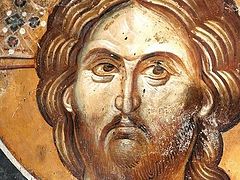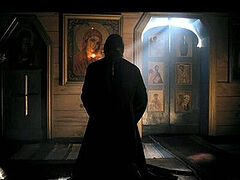Blessed are they which are persecuted for righteousness’ sake:
for theirs is the Kingdom of Heaven.
Blessed are ye, when men shall revile you, and persecute you,
and shall say all manner of evil against you falsely, for My sake.
Rejoice, and be exceeding glad: for great is your reward in Heaven:
for so persecuted they the prophets which were before you (Mt. 5:10-12).
The Beatitudes of Christ describe the spiritual life that the Lord gives to man in the Church. They precisely define the quality of this life and the space in which it develops, is concentrated, and exists. However, a superficial glance could lead to a misunderstanding of their meaning. But if we ponder these words of Christ deeply and analyze them, we’ll see that in the end they all lead to one result—to nothing other than the Kingdom of God, that is, to Christ Himself, to our communion with Christ. Christ Himself says:
I am Alpha and Omega, the beginning and the ending (Rev. 1:8).
He is the Way along which He leads us, but He is also the end of the Way, and He is the One we’re interested in. Our life develops and revolves around Christ, not around ideas—the idea of righteousness, as it says here, blessed and persecuted. In the Church, righteousness isn’t some idea of righteousness, an idea that we have about justice, for injustice and various types of unrighteousness reign in the world, and they need to be corrected. Therefore, there are people who are doing well and fighting for the “imposition” of righteousness upon human society as far as possible. These people who fight for righteousness are worthy of praise, but they aren’t the ones the Lord makes happy in the Gospel. Righteousness for man is when the grace of God comes into his heart, that is, his healing. In other words, an unjustified man is a man deprived of God’s grace, and the justified is a man who has God’s grace. Just like in everyday life, we say that this man is ill-fated because he has lost his parents, or something else he should have, like health, development, money, and everything else that’s considered a sign of well-being—or perhaps he even died young.
It’s considered that such a man suffered from unrighteousness, but the greatest unrighteousness is when a man is deprived of God’s grace. This is a genuine unrighteousness, and the justification of a man occurs when God’s grace returns to him and directly recreates him, justifies him, gives him the justification that he lacked, gives him the opportunity to have communion with his Heavenly Father—God. The absence of the Heavenly Father is the greatest unrighteousness for man: to deprive yourself of the presence of the Living God! This is the greatest unrighteousness you can inflict upon yourself.
And the greatest evil for yourself is if you yourself become the cause of the rupture of your communion with the Heavenly Father. Then you develop a complex about the absence of a parent. The absence of biological parents causes various mental reactions and complications in the soul of a man, and how much more such reactions are caused by the absence of the Heavenly Father! This is always strongly expressed and visibly manifested in a man. And no matter how hard we try to hide it, no matter how we try to avoid realizing it, it’s all the same to someone who has spiritual experience and knows what the spiritual life is; that is, to someone who has experience of this spiritual balance that is granted by the grace of God, the “radiation” of our state that arose due to the absence of the Heavenly Father is clearly visible.
 We go to our spiritual father and we get a response that, it seems to us, doesn’t correspond to our question. That is, we say:
We go to our spiritual father and we get a response that, it seems to us, doesn’t correspond to our question. That is, we say:
“You know, Father, I go around barefoot, and my feet hurt!”
And instead of saying: “Go buy yourself some shoes so you won’t have to be barefoot,” your spiritual father says:
“God isn’t with you! You need to restore your relationship with Him!”
It seems the answer has nothing to do with the question. When I was a new monk, I also received such answers.
One day, several young people came to my elder and asked him about something. I had just graduated from college. When they asked the Elder their questions, there were already answers “born” in my mind—philosophical, collegiate, academic. But the Elder answered them differently. The young men asked one thing, and the Elder answered another. I said to myself: “The Elder probably doesn’t understand what they’re asking him.” They were philologists, and one of them was an archaeologist. The Elder didn’t answer their questions, but talked about something else entirely. Everything within me screamed:
“Does he really not hear what they’re saying to him?! Is this some kind of joke?”
These young people were asking him about “A,” and he was answering about “B.” It happened once, twice, three times. I was so indignant about all this that I wanted to correct the situation, to explain to the Elder that they were asking him about one thing and he was telling them about another.
And not only didn’t he answer their questions, but he was also angry at them. The Elder was speaking with them sharply and sternly. In the end, he told them what they wanted to hear. It was like when a sick man goes to a doctor and tells him:
“I have a cough!”
And the doctor says to him:
“It’s not a cough. I think it’s a tumor. Haven’t you thought about that?”
The doctor didn’t prescribe him any cough syrup and didn’t tell him to go home and get well.
He saw the deeper reason for his patient’s sickness.
I also remember another time when I was on the ferry from New Skete to Daphne. There was a German—a philosophy teacher, and Elder Theoklitos of Dionysiou on the boat as well. He boarded the ferry and sat down. I sat down next to him, and we started talking. The teacher came up to us and said:
“Oh, are you Fr. Theoklitos of Dionysiou?”
“Yes!”
“I really wanted to meet you, to talk to you, to ask you questions that interest me, because I’m a philosophy teacher. You’re also a philosopher; you write books…”
Elder Theoklitos nodded his head.
The teacher started asking him various questions—I don’t remember what about specifically. Instead of answering them, Elder Theotklitos started quoting the Akathist to the Most Holy Theotokos. The teacher asked his questions, and in response the Elder said: “We see most eloquent orators mute as fish before Thee, O Theotokos; for they are at a loss to tell how Thou remainest a Virgin and could bear a child.” The teacher looked at him with surprise. I said to myself:
“Now he probably thinks Elder Theoklitos is crazy.”
What did this whole conversation between the teacher and Elder Theoklitos boil down to? To one general question, although the teacher didn’t ask it of the Elder. This was the question: What disturbed him in the Church? He was disturbed by the fact of the overcoming of logical and natural laws in the Church in the situation with the Most Holy Theotokos, that is, how the Most Holy Theotokos gave birth to Christ, and that whole mystery.
So when we go to church to our spiritual father and want to ask him something, of course we do it in the name of Christ and with prayer, and we should be ready to accept these words. That is, to accept them not slavishly, but to hear the words our spiritual father speaks. Because it’s very likely that we’ll ask our spiritual father something, expecting an answer, but we won’t get one, or we won’t get the one we expected—but in reality it’s precisely the answer we needed. In any case, it’s a fact that the Church, that is, the word of God, born in man, is born in a mystery. In this mystery of the question, in the name of Christ it’s mainly directed to the center of man, to his heart, and it profoundly heals the whole man—but not superficially—and it destroys the root of evil, from which all evil things come.





